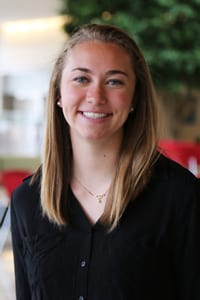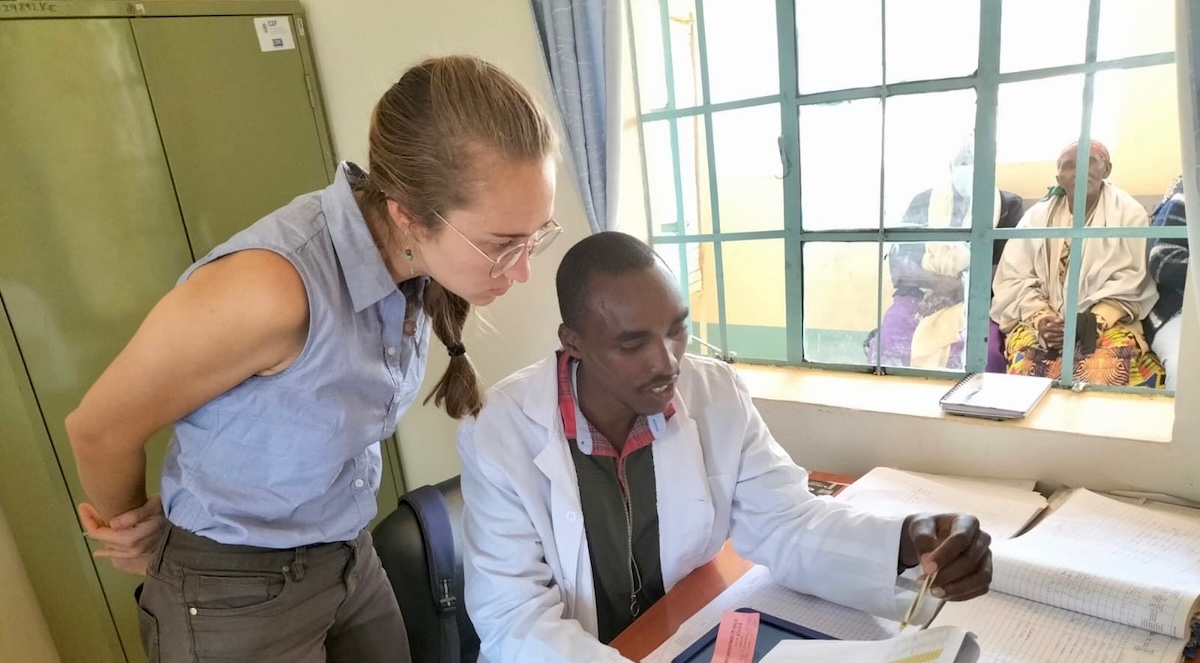Mastering the ‘spirit of frugal innovation’
A line from Apple founder Steve Jobs’ 2005 Stanford University commencement address carries special meaning for Kayla Huemer as she ventures out into Africa, committed to advancing global health development through technology.

“He said, ‘You can’t connect the dots of your life looking forward; you can only connect them looking backward,’” Huemer says. “Looking back, the starting dot for me was working at the Morgridge Institute for Research. The skills I learned there, the mentors I gained and the opportunities I was given — they were the starting dot that got me to where I am today.”
Raised in Mount Horeb, Wis., Kayla earned her biomedical engineering degree at the UW–Madison while conducting research at Morgridge. She worked as a BerbeeWalsh Prototype Pathway student in the Fab Lab on fabrication of a zebrafish live imaging device along with researchers Robert Swader, George Petry, Ben Cox and Morgridge Investigator Kevin Eliceiri.
“One of the most valuable skills I gained from my time at Morgridge was the collaborative aspect of bringing people together from different disciplines and not being intimidated that someone else was an expert in their field,” she says. “I learned to see the intersection of my skills and their expertise as an opportunity to create something novel. That’s what I found most exciting.”
As an undergraduate, Huemer went to India for a research internship at the Indian Institute of Science in Bangalore. Using the engineering and design skills she honed at Morgridge, Huemer developed a prototype of a “Smart Shoe,” wearable device for diabetic patients to aid in the therapy of foot ulcers often experienced by patients with diabetes.
“Through my experience at Morgridge’s Fab Lab, I often worked with doctors and biologists. Then in India, I felt myself directly building on that confidence to work with doctors there.”
Her experience helped her earn a U.S. Fulbright research grant to continue developing the device at India’s CMC Vellore Hospital the year following her UW–Madison graduation.
There’s a Hindi word for it — jugaad — which means ‘the spirit of frugal innovation.’ I had found a gem of a concept many people back home struggled to relate to. It’s a mindset you use for solving problems when resources are strained.
Kayla Huemer
“While in India, I saw the way people were so resilient and creative in the way they solved problems when something would break,” she says. “There’s a Hindi word for it — jugaad — which means ‘the spirit of frugal innovation.’ I had found a gem of a concept many people back home struggled to relate to. It’s a mindset you use for solving problems when resources are strained.”
Huemer returned to Morgridge in 2019 as a visiting fellow exploring the use of machine learning to pull novel insights out of data she collected in India.
This set her on the path to graduate school at Stanford to study artificial intelligence in healthcare, global health, and design. There, she earned a master’s in bioengineering, honing her love of low-resource engineering.
Her Morgridge experience helped inform her work across the African continent. Based in Nairobi, Kenya, she worked as a product manager for the social-impact organization Medtronic LABS. She helped accelerate healthcare access through technology for underserved communities in Kenya, Ghana, Tanzania, and Sierra Leone.
This June, she transitioned to a role as head of product for Jacaranda Health, which works to strengthen maternity and child health. She works with PROMPTS, an AI-enabled digital health service that, through two-way text message exchange, empowers Kenyan women to seek care at the right time and place, ask questions, and provides information and greater agency in the health system.
“The ability to work with people from several fields to align on technology’s value and opportunity for innovation is something I began learning in Morgridge’s collaborative environment,” she says.

Rising Sparks: Early Career Stars
Rising Sparks is a monthly profile series exploring the personal inspirations and professional goals of early-career scientists at the Morgridge Institute.
